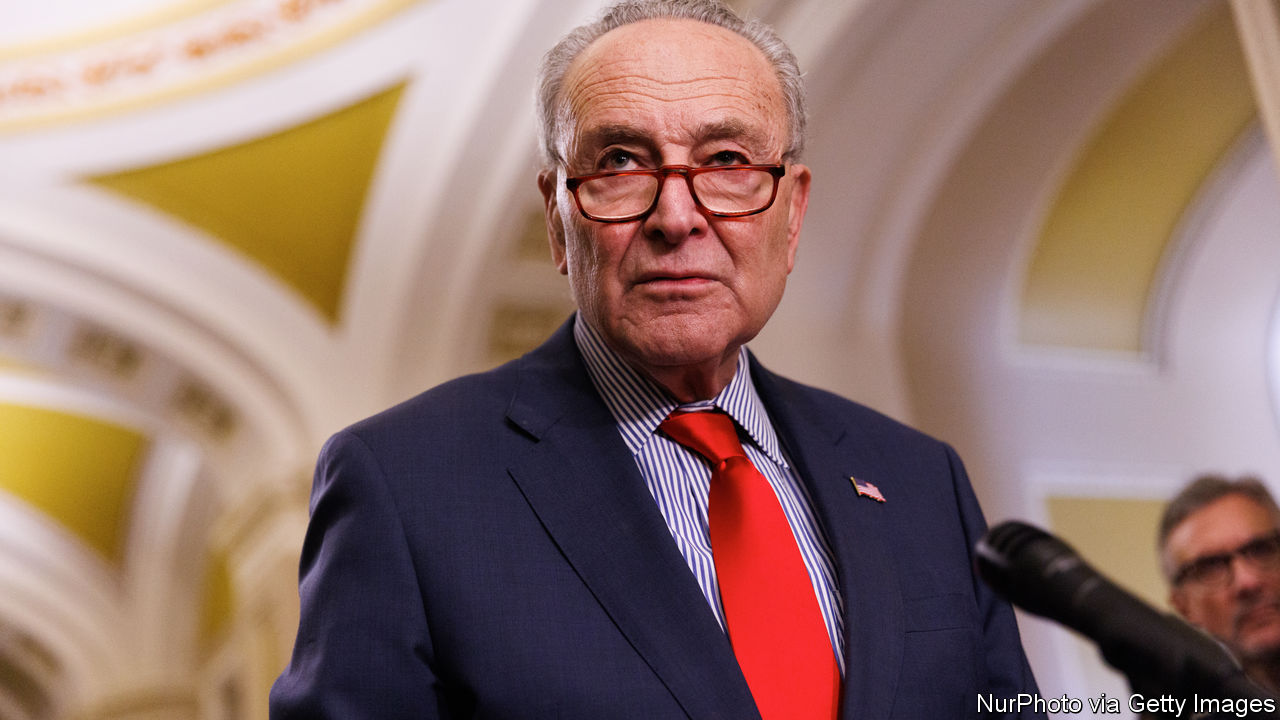CHUCK SCHUMER, the majority leader of the US Senate and America’s highest-ranking Jewish official, is fond of noting that his surname derives from the Hebrew word shomer, or guardian. Although his primary obligation is to America, he likes to say, he also feels a duty to live up to his name and act as a guardian of the people of Israel. Mr Schumer made this familiar point during a speech on March 14th, but his remarks on the Senate floor about Binyamin Netanyahu were anything but ordinary.
“Prime Minister Netanyahu has lost his way by allowing his political survival to take precedence over the best interests of Israel,” Mr Schumer said during a 44-minute speech. “I believe a new election is the only way to allow for a healthy and open decision-making process about the future of Israel.”
Presidents and secretaries of state have criticised Israel over the course of its 75-year relationship with the United States, typically on discrete issues for limited periods. Yet the de facto political leader of America’s Jews calling for political change in Jerusalem is a watershed moment, even as Mr Schumer stressed that “Israel has the right to choose its own leaders, and we should let the chips fall where they may.” It reflects a crisis of confidence.
Joe Biden, who often goes out of his way to avoid criticising American allies publicly, said the following day that Mr Schumer gave a “good speech”. (The president, however, fell short of fully endorsing it by only allowing that “many Americans” shared the majority leader’s concerns.) Mr Schumer’s Republican counterpart in the Senate, Mitch McConnell, called his remarks grotesque and hypocritical—the starkest example yet of the growing partisan gap on how to manage relations with the Jewish state.
What effect could Mr Schumer’s comments have on Israeli politics? Mr Netanyahu has not yet reacted, though his Likud party shot back in a statement that “Israel is not a banana republic.” Benny Gantz, a member of Mr Netanyahu’s war cabinet but a rival minister likely to replace him if elections were held, said Mr Schumer’s remarks were a mistake. In Washington earlier this month Mr Gantz met senior members of the Biden administration. A Gantz government would no doubt make the relationship easier, though unlike Mr Biden he is not keen on a two-state solution, so relations would still be far from simple.
“Israelis of all political views are coexisting in the same bubble of trauma, insecurity, fear and worry. It makes them all incapable of hearing anybody or anything else,” says Martin Indyk of the Council on Foreign Relations, a think-tank, and a former US ambassador to Israel. “They are largely oblivious to the suffering of the Palestinians and seemingly uncaring about the rift with the United States, Israel’s only reliable friend in this crisis.”
The greater immediate impact of Mr Schumer’s remarks is likely to be on the debate over Israel in America. The Senate leader and the president are among the most pro-Israel Democrats in American history, but many on the party’s left wing are deeply critical of the country’s government. Mr Biden initially kept his criticism of how Israel has conducted this war private. Recently he has been openly critical while refusing to use his leverage, such as by withholding military support, or backing UN resolutions condemning Israel.
Mr Schumer’s comments have given Mr Biden cover to take a tougher stance. But Aaron David Miller, of the Carnegie Endowment for International Peace, another think-tank (and a veteran negotiator of would-be Middle East peace deals), does not expect major changes to Mr Biden’s “passive-aggressive” approach just yet. The only way for Mr Biden to resolve the political, moral and policy conundrums that Israel’s assault on Gaza has produced, Mr Miller reckons, is for the images coming out of Gaza to change. Mr Biden may get tougher, “but I don’t see it happening now, particularly given the fact that for the first time in weeks, there may be some openings on the ground” as Israel permits more humanitarian assistance and sends negotiators to Qatar.
However, if an Israeli assault on Rafah, where some 1.4m Palestinian civilians are sheltering, produces massive casualties, Mr Biden’s tone could become much more critical, much faster. “Whatever happens,” adds Mr Indyk, “pressure is now an overt part of the US-Israel relationship.” ■

 Accounting1 week ago
Accounting1 week ago
 Economics1 week ago
Economics1 week ago
 Personal Finance1 week ago
Personal Finance1 week ago
 Accounting1 week ago
Accounting1 week ago
 Finance1 week ago
Finance1 week ago
 Economics1 week ago
Economics1 week ago
 Economics1 week ago
Economics1 week ago
 Economics1 week ago
Economics1 week ago





















